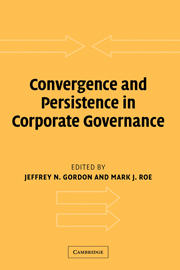Book contents
- Frontmatter
- Contents
- List of figures
- List of tables
- List of contributors
- Acknowledgments
- Introduction
- PART I Systemic issues
- PART II Government players
- PART III Specific institutions
- 8 The politics of corporate convergence
- 9 Ungoverned production
- 10 Convergence of substantive law and convergence of enforcement: a comparison
- 11 Cross-shareholding in the Japanese keiretsu
- Index
10 - Convergence of substantive law and convergence of enforcement: a comparison
Published online by Cambridge University Press: 04 March 2010
- Frontmatter
- Contents
- List of figures
- List of tables
- List of contributors
- Acknowledgments
- Introduction
- PART I Systemic issues
- PART II Government players
- PART III Specific institutions
- 8 The politics of corporate convergence
- 9 Ungoverned production
- 10 Convergence of substantive law and convergence of enforcement: a comparison
- 11 Cross-shareholding in the Japanese keiretsu
- Index
Summary
Despite many similarities among the corporate governance systems of the leading industrial countries, there are also many important differences, including the basic level of investor protection. The question, of course, is whether these differences will prove durable in the face of the globalization of trade and investment. These forces jointly favor some degree of convergence, either because they are accompanied by statutory harmonization or because they reduce barriers to extra-jurisdictional influence.
The purpose of this chapter is to point out that “convergence” is not simply a feature of substantive law – of the expression of rights and duties that is characteristic of law. Rather, convergence also depends upon whether those legal rights and duties are enforced to comparable effect. In other words, convergence of law on the books does not necessarily correlate positively with convergence in enforcement – there might be even trade-offs between them. My goal is not to focus on the theoretical aspects of the relations between substantive law and enforcement in the corporate governance area, but rather to show the “volatility” of the convergence correlation and to explore its implications.
Section I describes my analytic approach. Subsequent sections (I–VIII) compare convergence of substantive law and convergence in enforcement in six areas which are important for corporate governance: transparency; voting rights; fiduciary duties; insider trading; takeovers; and bankruptcy.
- Type
- Chapter
- Information
- Convergence and Persistence in Corporate Governance , pp. 328 - 347Publisher: Cambridge University PressPrint publication year: 2004
- 8
- Cited by



